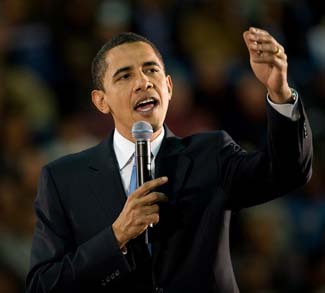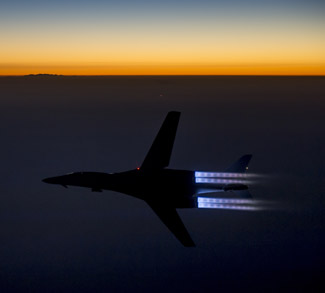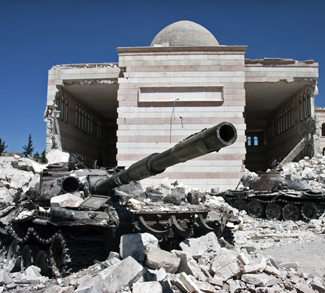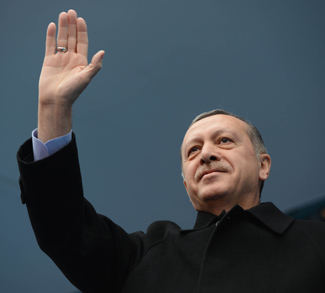Anyone who has traced the full arc of the Obama presidency knows that when US bombs started falling on Islamic State targets last month, it was kind of a big deal. Here was the precise moment when jihad’s “JV team,” having truly played its heart out and silenced all the critics, was raising in triumph its prize of President Obama’s credibility as commander in chief.
Weeks later came the big speech that was going to provide details on this US reversal in Iraq. Viewers huddled around their TVs to learn what exactly the United States was going to do about Islamic State now that it had ascended the global threat ranking with such stunning alacrity. Some hoped for an admission that mistakes were made in Syria and Iraq; most expected a strategy that at least learned from them.
Everyone was disappointed.
Obama’s Islamic State policy speech is a study in old habits dying hard – the wrong habits. It had all of the messianic flair of George W. Bush speech in its allusions to the US quest to vanquish evil from the world, but none of the reckless unilateralism that could decisively alter the course of events on the ground.
Cue a natural question: ‘Isn’t the reckless unilateralism better left in the past?’ In terms of a holistic view of US foreign policy, this is probably true. But in terms of dealing with the actual problem of Islamic State, it gets a bit more complicated. President Obama is not grappling with historical hypotheticals here (on which we already know his opinion regardless). Rather, he is facing an existential military and political crisis, one that can’t be ignored even if every moral fiber in the president’s being recoils at the prospect of another US military deployment in the region.
Common sense dictates that there are two ways out of the current crisis. The president could either take a page out of George W. Bush’s book and recommit boots on the ground, unpopular as such a move would be (the Surge redux). Though hugely expensive and politically suicidal, this would enable the kind of community-level trust-building needed if the Sykes-Picot imagining of Iraq is to survive. The other option would be to work with all of the regional players, even the politically unsavory ones, in order to close the power vacuum that’s currently fueling the Islamic State insurgency.
The path that the ultimately president chose – extending support to a nearly non-existent Free Syrian Army (FSA) and upping air strikes and military advisors – was tantamount to looking at the hard options available and going with ‘none of the above.’
Take Syria for example. The Obama plan relies on the FSA as its proxy, a fighting force that has already effectively lost the war against the jihadists, suffering defeat, desertion, and dispersal across Syria and Turkey. According to the president’s logic, US arms, air strikes, and training will transform the FSA into a major player on the battlefield, allowing it to defeat not only Islamic State but the government forces of al-Assad, and help the Syrian people realize their innate desire for liberty.
It’s almost as if Obama was present for the outbreak of the Arab Spring, but nothing of what came later. People who took to the streets across the MENA region and fought for their freedom subsequently met with violence, chaos, and deprivation such that many would gladly take their previous tyrants back if it meant a return to political stability (Egypt traded one military government for another; Libya traded for anarchy). The takeaway here is this: democracy is a delicate process that must be nurtured and developed over a long period of time; not a political revelation that can be dropped like banned ordnance from the skies above.
So suspending our disbelief surrounding the titanic logistical challenge of whipping the FSA into fighting shape (recall that the decade-trained, billions-equipped Iraqi Army turned and fled from Mosul), what would Damascus look like in the event of a FSA victory? It would probably be bloody, sectarian, and chaotic – more the scene of brutal score settling than any birthplace for Syrian democracy.
The rise of Islamic State is a looming threat to global stability, and it’s going to take some forward thinking to put the genie back in the bottle. For one, if President Obama is determined to keep US troops out of the fray, he’s going to need to work constructively with the regional actors who can make a difference – even the ones which are anathema to Washington. In the case of Syria, the al-Assad regime is the only real hope of countering Islamic State on the battlefield. And the Iranian government is going to help decide the future of Iraq whether the United States likes it or not, this much was guaranteed as far back as the removal of Saddam Hussein. Both of these regimes are directly in the crosshairs of Islamic State’s narrow interpretation of Islamic heresy, and both have a vested interest in defeating the militant group.
If President Obama’s aversion to a more practical, less ideological strategy was motivated by not wanting to take sides and risk inflaming Sunni-Shiite tensions that might be understandable. But given the recent history of US foreign policy in the Middle East, the president has already taken sides; arguably the wrong side. Saudi Arabia, Qatar, and a few of the other Arab states being lauded for joining Obama’s anti-IS coalition are rumored to have been some of the first patrons of Islamic State, at least back in the early days when the group seemed like a good horse to back in the stakes to unseat al-Assad.
The Syrian civil war was never about democracy or human rights. It was a geopolitical power play pure and simple, a way for Riyadh to deprive its arch-rival of an important ally in Syria. It appears that nowadays everyone is aware of this fact except for President Obama.
The United States has indirectly enabled these regional games up until now, partially out of deference to an old, oil-rich ally in Saudi Arabia and partially owing to its own tumultuous history with revolutionary Iran. But the rise of ISIS has laid bare the dangers of such an approach. If Washington wants a stable Middle East without committing any troops to the region on a permanent basis, it’s going to need to stop pretending that Iran doesn’t exist, and start being realistic about the prospects for healthy democracies operating over top a historical minefield of sectarian tension.
In short, Obama must be more flexible and less ideological.
The argument over whether or not the United States should commit more blood and treasure to a conflict-ridden Middle East is crucially important, and it should continue unabated. But as for this particular plan of President Obama’s, there’s much less room for debate – it’s deeply flawed, and it will fail.
The opinions, beliefs, and viewpoints expressed by the authors are theirs alone and don’t reflect any official position of Geopoliticalmonitor.com.




